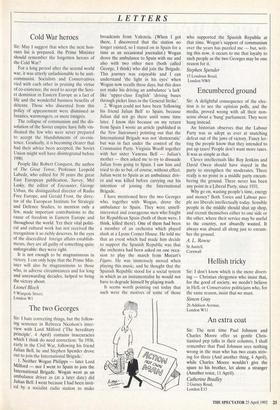The two Georges
Sir: 1 hate correcting things, but the follow- ing sentence in Rebecca Nicolson's inter- view with Lord Milford (`The hereditary principle', 4 April) contains inaccuracies which I think do need correction: 'In 1936, early in the Civil War, following his friend Julian Bell, he and Stephen Spender drove out to join the International Brigade.'
1. Neither Wogan Philipps — later Lord Milford — nor I went to Spain to join the International Brigade. Wogan went as an ambulance driver as (at a later date) did Julian Bell. I went because I had been invit- ed by a socialist radio station to make broadcasts from Valencia. (When I got there, I discovered that the station no longer existed, so I stayed on in Spain for a time as an occasional journalist.) Wogan drove the ambulance to Spain with me and also with two other men (both called George, I think) who did join the Brigade. This journey was enjoyable and I can understand 'the light in his eyes' when Wogan now recalls these days, but this does not make his driving an ambulance 'a lark' like 'upper-class English' driving buses through picket lines in the General Strike'.
2. Wogan could not have been 'following his friend Julian Bell' to Spain, because Julian did not go there until some time later. I know this because on my return from Spain I wrote an article (published in the New Statesman) pointing out that the International Brigade was not 'democratic' but was in fact under the control of the Communist Party. Virginia Woolf together with her sister Vanessa Bell — Julian's mother — then asked me to try to dissuade Julian from going to Spain. I saw him and tried to do so but, of course, without effect. Julian went to Spain as an ambulance driv- er and was killed before carrying out his intention of joining the International Brigade.
I have mentioned here the two Georges who, together with Wogan, drove the ambulance to Spain. They were unself- interested and courageous men who fought for Republican Spain (both of them were, I think, killed there). One of them had been a member of an orchestra which played slush at a Lyons Corner House. He told me that an event which had made him decide to support the Spanish Republic was that the orchestra had been asked on one occa- sion to play the march from Mozart's Figaro. He was immensely moved when playing this music, and he thought that the Spanish Republic stood for a social system in which as an instumentalist he would not have to degrade himself by playing trash.
It seems worth pointing out today that such were the motives of some of those who supported the Spanish Republic at that time. Wogan's support of communism over the years has puzzled me — hut, writ- ing this now, it occurs to me that loyalty to such people as the two Georges may be one reason for it.
Stephen Spender
15 Loudoun Road, London NW8


























































 Previous page
Previous page